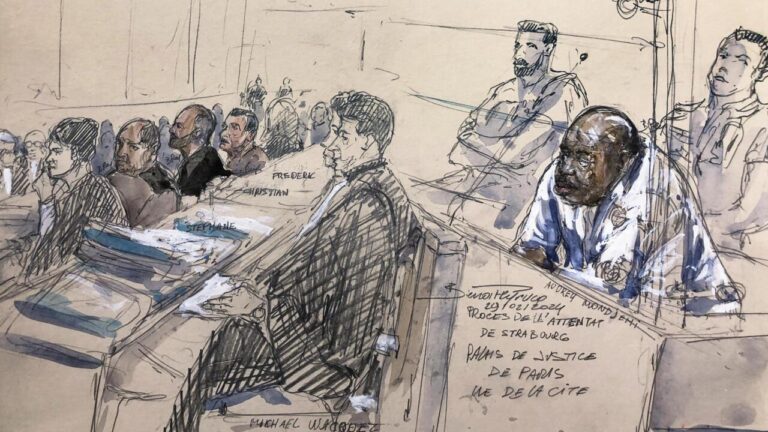In a significant judicial development, the main defendant in the Strasbourg terror attack has been sentenced to 30 years in prison, a decision announced by a French court on Thursday. This ruling marks a critical moment in the aftermath of the tragic incident that took place at a Christmas market in December 2018, resulting in five fatalities and numerous injuries. The court’s verdict not only underscores the severity of the crime but also serves as a reminder of the ongoing challenges Europe faces in addressing terrorism. As the legal proceedings unfold, the ramifications of the attack continue to resonate throughout the region, raising vital questions about security, justice, and the fight against radicalization.
Strasbourg Terror Attack Sentencing: A Reflection on Justice and Security
The recent sentencing of the main defendant involved in the Strasbourg terror attack brings a complex narrative of justice to the forefront of public discourse. The court’s decision to impose a 30-year prison term reflects a dual commitment to punitive justice and the safety of the community. This verdict not only seeks to address the immediate consequences of the heinous act but also aims to serve as a deterrent against future offenses. Victims and their families have been at the heart of this proceeding, and the ruling stands as an acknowledgment of their suffering.
However, amidst the legal triumphs, questions about national security and broader implications persist. While the judiciary has acted decisively, the events surrounding the attack have ignited discussions about preventive measures and intelligence sharing within Europe. Key considerations include:
- Enhanced cooperation among European states to combat terror threats
- Civil liberties versus surveillance: a crucial balance
- Community engagement in counter-radicalization efforts
The effectiveness of these measures will be critical in shaping the future landscape of security across the continent, ensuring that justice is not only served but also evolves in step with emerging threats.
Impact of the Verdict on France’s Counterterrorism Measures
The recent sentencing of the primary defendant in the Strasbourg terror attack to 30 years in prison has significant implications for France’s counterterrorism landscape. This verdict serves not only as a legal measure but also as a symbolic statement of the country’s commitment to combating extremism. The judicial outcomes are likely to influence ongoing legislative debates that are central to France’s national security strategy. Among the anticipated changes, enhanced surveillance measures, stricter controls on suspected extremists, and increased cooperation with European partners in intelligence sharing are under discussion.
Moreover, the verdict may catalyze a broader public discourse on the effectiveness of France’s counterterrorism policies. As the nation grapples with the balance between security and civil liberties, this case serves as a reminder of the need for a comprehensive approach to prevent radicalization. Key elements to watch include:
- Increased funding for security services: An emphasis on bolstering resources for police and intelligence agencies.
- Community engagement initiatives: Programs aimed at fostering relationships between law enforcement and local communities to deter radicalization.
- Legislative proposals: Potential new laws aimed at tightening security protocols around public spaces and enhancing counter-radicalization efforts.
| Measure | Focus Area |
|---|---|
| Surveillance enhancement | Preventing attacks |
| Community outreach | Radicalization prevention |
| Legislative changes | Legal frameworks |
Victims’ Families Respond: A Call for Healing and Solidarity
The families of the victims of the Strasbourg terror attack have expressed a mix of profound grief and a resolute call for community healing. In the wake of the sentencing of the main defendant to 30 years in prison, these families have come together to share their experiences and the enduring pain left by the tragic event. “Our loss is immeasurable,” declared a spokesperson for the families, emphasizing the long-lasting void that cannot be filled. Community vigils have begun to pop up across Strasbourg, where families and supporters gather to honor the memories of those they lost, affirming the importance of shared grief as a pathway to healing.
In a powerful statement, the families urged the public to stand in solidarity against hate and violence. They highlighted the need for greater awareness and compassion in society, advocating for programs that foster understanding across different cultures and communities. Through initiatives that promote dialogue and support, they believe that healing can begin. Families have outlined key topics they hope to address, including:
- Community Resilience: Strengthening local support networks.
- Educational Workshops: Focused on tolerance and understanding.
- Memorial Events: Dedicated to honoring victims and promoting peace.
They call upon local leaders and the broader public to unite against terrorism and to reject divisions wrought by fear. In their view, creating a harmonious community is essential to ensure that such tragedies do not repeat in the future.
Looking Ahead: Recommendations for Strengthening Community Resilience
In the wake of the Strasbourg terror attack, it’s vital for local authorities and community organizations to come together and bolster resilience efforts to mitigate future incidents. A strategic approach can enable communities to recover more effectively while fostering a sense of security among residents. Key recommendations include:
- Enhanced Community Programs: Implement initiatives that encourage neighborly interactions, such as community events and workshops focused on awareness and preparedness.
- Education and Training: Provide training sessions on crisis response and first aid to equip locals with skills necessary during emergencies.
- Collaboration with Law Enforcement: Strengthen partnerships between residents and police to promote trust and facilitate the sharing of information regarding potential threats.
Additionally, investing in mental health resources will play a crucial role in helping the community process trauma and rebuild strength. Mental health professionals should be available for outreach programs, offering support to those affected by the attack. Moreover, the establishment of community safety committees can engage citizens in dialogues about safety concerns and strategies for prevention. A focused approach to resource allocation could look something like this:
| Resource Type | Purpose |
|---|---|
| Mental Health Services | Support trauma recovery |
| Safety Workshops | Enhance preparedness |
| Youth Engagement Programs | Foster inclusion and awareness |
To Conclude
In the aftermath of the Strasbourg terror attack, the conviction of the main defendant to 30 years in prison marks a significant moment in the ongoing fight against terrorism in France. This ruling not only serves as a measure of justice for the victims and their families but also underscores the resilience of a nation grappling with the scars of past atrocities. As France continues to navigate the complexities of security, civil rights, and community cohesion, the sentencing is a reminder of the enduring impact of extremism and the necessity for vigilance and solidarity in the face of violence. As the nation reflects on the implications of this case, it remains committed to addressing the challenges of radicalization, ensuring that such tragedies do not define its future.




